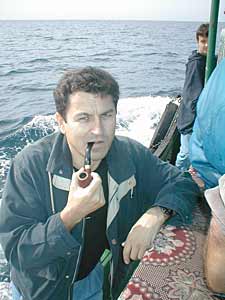
New Managing Director for Bellona Norway
The Board of the Bellona Foundation has appointed former Minister of Climate and the Environment Sveinung Rotevatn as Managing Director of Bellona No...
News

Publish date: May 16, 2003
Written by: Jon Gauslaa
News
Pasko was released on parole on January 23, 2003, after having served two thirds of a bogus four-year espionage conviction. He submitted his application for a passport to the office of the Passport Registration Authority of Moscows Southern District on March 12, 2003. According to reliable sources at this office all formal hindrances were cleared. It was thus, expected that Pasko would receive his new passport shortly.
Internal regulations
However, it turns out that the Central Management of the Passport Registration Authority has taken over the case. Earlier this week this authority refused Paskos application referring to internal regulations, but without revealing their content.
No matter what content the regulations might have, they contradict Article 27 (2) of the Russian Constitution, which guarantees the citizens freedom of movement. The freedom of movement is also protected by Article 4 of Protocol 2 to the European Convention on Human Rights. Russia has ratifies both the Protocol and the Convention.
Besides, the Russian Federal Law on the exit and entry of the territory of the Russian Federation, which contains more detailed regulations regarding the issuing of passports to Russian citizens, contains no exceptions for former convicts or persons who recently have been released from prison on parole.
No legal basis
Thus, it seems clear that the refusal of Paskos passport application are without legal basis, and that it is based on internal regulations violating Russian Federal and Constitutional Law as well as Russias international obligations.
Pasko has already complained to higher administrative authorities. In his struggle he may find inspiration in the experiences of Bellonas Aleksandr Nikitin, who faced similar problems when he applied for a passport after having been acquitted of espionage charges.
His application was rejected in February 2000 when the bureaucrats of St. Petersburgs Passport Registration Authority smiled knowingly at him, pointing towards the FSB building: – You understand, of course, who stands behind this decision
Traces of Stalinism
The decision was, however, overturned after Nikitin had filed a complaint. He got his passport in May 2000. It is reason to believe that the same will happen with Pasko. Still the recent dodge from the passport authorities is a disturbing indication that the harassment against him from certain quarters within the Russian bureaucracy is continuing.
Lev Bronstein (a.k.a. Trotsky) once defined Stalinism as the bureaucracys dictatorship over the people. Judged from the latest chapter in the saga of Grigory Pasko there are still some remnants of Stalinism within the Russian bureaucracy.

The Board of the Bellona Foundation has appointed former Minister of Climate and the Environment Sveinung Rotevatn as Managing Director of Bellona No...

Økokrim, Norway’s authority for investigating and prosecuting economic and environmental crime, has imposed a record fine on Equinor following a comp...

Our op-ed originally appeared in The Moscow Times. For more than three decades, Russia has been burdened with the remains of the Soviet ...

The United Nation’s COP30 global climate negotiations in Belém, Brazil ended this weekend with a watered-down resolution that failed to halt deforest...